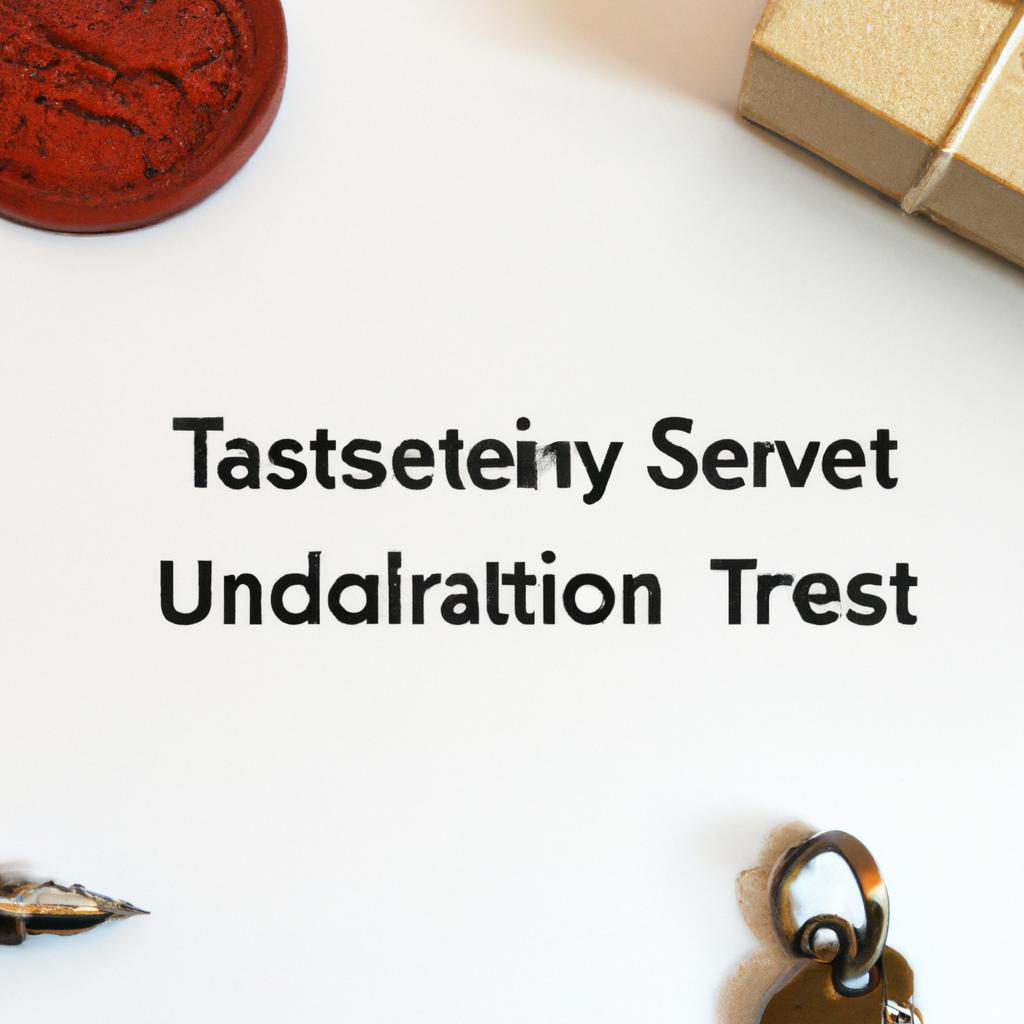In the intricate web of estate planning, the concept of trust wills emerges as a fundamental pillar for ensuring the seamless transfer of assets and properties to future generations. At Morgan Legal Group, nestled in the heart of New York City, we understand the importance of establishing trust wills and estates that serve as a testament to our clients’ intentions and wishes. As seasoned practitioners in the realm of estate law, we are dedicated to guiding our clients through the nuances of trust structures, ensuring their legacies are preserved and their loved ones are provided for. Join us as we delve into the intricacies of trust wills and explore the invaluable role they play in securing your family’s future prosperity.
– Understanding the Importance of Trust Wills in Estate Planning
Creating a trust will is a crucial component of estate planning that should not be overlooked. A trust will allows individuals to specify how their assets will be distributed upon their passing, ensuring that their wishes are carried out according to their exact specifications. By establishing a trust will, individuals can provide for their loved ones in a way that aligns with their values and priorities, offering peace of mind and security for all parties involved.
Trust wills also offer a level of privacy that traditional wills may not provide. Unlike probate, which is a public process, trusts allow for the confidential transfer of assets to beneficiaries without the need for court involvement. This added layer of privacy can help families avoid potential disputes or challenges to the distribution of assets, ensuring a smoother transition of wealth and possessions to future generations.

– Key Considerations When Setting Up Trusts and Establishing Trustees
When establishing trusts, it is crucial to carefully consider who will serve as trustees. The choice of trustees can significantly impact the effectiveness and success of the trust. Here are some key considerations to keep in mind:
- Trustee’s Qualifications: Ensure that the appointed trustee has the necessary skills, knowledge, and experience to effectively manage the trust assets and make sound financial decisions.
- Trustee’s Integrity: Select a trustee who is trustworthy, reliable, and ethical. The trustee should act in the best interests of the beneficiaries and adhere to the terms of the trust.
- Trustee’s Availability: Consider the trustee’s availability and willingness to fulfill their duties and responsibilities. It is important to choose someone who can dedicate the time and effort required to administer the trust.
Furthermore, it is essential to establish clear guidelines and instructions for trustees to follow when managing the trust. Communication and transparency are key to ensuring that the trust operates smoothly and that the beneficiaries’ needs are met. Additionally, trustees must comply with legal and fiduciary responsibilities to avoid any potential conflicts or disputes. By carefully selecting trustees and providing them with adequate support and guidance, you can create a trust that effectively achieves your estate planning goals.

– Maximizing the Benefits of Trust Wills for Asset Protection and Inheritance Planning
Trust wills are powerful tools for asset protection and inheritance planning. By establishing a trust within your will, you can ensure that your assets are distributed according to your wishes, while also providing protection from creditors and potential disputes among beneficiaries. Trust wills offer a level of control and flexibility that traditional wills may not provide, making them a valuable option for those seeking to maximize the benefits of their estate plan.
One key benefit of trust wills is the ability to designate a trustee to manage and distribute assets on behalf of beneficiaries. This can help to prevent mismanagement of assets and ensure that they are used in accordance with your intentions. Additionally, trust wills can provide tax advantages and minimize estate taxes, allowing you to pass on more of your wealth to your loved ones. With careful planning and the guidance of experienced estate planning professionals, trust wills can be an essential tool for protecting your assets and securing your legacy for future generations.
– Expert Guidance on Crafting Trust Wills to Ensure Legal Compliance and Minimize Disputes
Trust wills are an essential component of estate planning, ensuring that your assets are distributed according to your wishes after you pass away. Crafting a trust will requires careful consideration and expert guidance to navigate the complexities of legal compliance and minimize the potential for disputes among beneficiaries. At Morgan Legal Group, our team of experienced estate planning attorneys specializes in creating trust wills that protect your assets and ensure a smooth transfer of wealth to your loved ones.
When creating a trust will, it is crucial to work with a knowledgeable attorney who can provide personalized guidance tailored to your unique circumstances. Our team at Morgan Legal Group understands the intricacies of trust wills and estates, offering comprehensive services to help you safeguard your legacy. By taking proactive steps to create a trust will that complies with all legal requirements and addresses potential challenges, you can minimize the risk of disputes and ensure that your wishes are carried out effectively. Trust wills are a powerful tool for managing your estate and providing for your heirs, and our experienced attorneys are here to help you navigate this process with confidence and peace of mind.
Q&A
Q: What is a trust will and how does it differ from a regular will?
A: A trust will is a legal document that allows for the distribution of assets and property to beneficiaries according to the terms set forth in a trust. Unlike a regular will, a trust will can help to avoid probate and provide more control over how assets are managed and distributed.
Q: Why would someone choose to create a trust will instead of a traditional will?
A: There are several reasons why someone may choose to create a trust will, including the ability to maintain privacy, avoid probate, provide for minor children or beneficiaries with special needs, or protect assets from creditors.
Q: How can a trust will help to protect assets for future generations?
A: By establishing a trust will, individuals can ensure that their assets are managed and distributed according to their wishes, even after they have passed away. This can help to protect assets for future generations and provide ongoing financial support for loved ones.
Q: What are some common misconceptions about trust wills and estates?
A: Some common misconceptions about trust wills and estates include the belief that they are only for wealthy individuals or that they are overly complex and expensive to create. In reality, trust wills can be beneficial for individuals of all income levels and can be relatively straightforward to establish with the help of a trusted legal professional.
Concluding Remarks
In conclusion, trust wills and estates offer a unique and flexible way to protect and distribute your assets according to your wishes. By placing your trust in a well-crafted estate plan, you can ensure that your loved ones are taken care of and your legacy is preserved for future generations. Whether you are just beginning to plan your estate or looking to make updates to an existing plan, trust wills can provide peace of mind and security for you and your family. Remember, it’s never too early to start thinking about the future and taking steps to protect what matters most to you. Trust in the process and trust in the power of a well-managed estate plan.
 Trusts, wills, and estates are terms that are often used interchangeably, but they serve distinct purposes when it comes to managing and distributing assets after someone passes away. While these legal documents may not be the most pleasant things to think about, they are crucial for protecting your assets and ensuring that your wishes are carried out after your death. In this article, we will explore the concept of trust wills and estates, their benefits, and why they are essential for anyone who wants to secure their legacy.
Trusts, wills, and estates are terms that are often used interchangeably, but they serve distinct purposes when it comes to managing and distributing assets after someone passes away. While these legal documents may not be the most pleasant things to think about, they are crucial for protecting your assets and ensuring that your wishes are carried out after your death. In this article, we will explore the concept of trust wills and estates, their benefits, and why they are essential for anyone who wants to secure their legacy.
What is a Trust?
A trust is a legal arrangement where a person, called the trustee, holds assets on behalf of another person, called the beneficiary. The trustee is responsible for managing these assets and distributing them according to the terms of the trust. Trusts can be set up for various reasons, such as providing for minor children or ensuring that assets are protected from creditors or divorce settlements. There are two main types of trusts: living trusts and testamentary trusts.
Living Trusts
Living trusts, also known as inter vivos trusts, are created while the person is alive and can be revocable or irrevocable. Revocable trusts can be changed or revoked entirely by the creator, while irrevocable trusts cannot be changed after they are created. The main benefit of a living trust is that it allows a person to transfer assets to their beneficiaries without going through probate, which is the legal process of validating a will and distributing assets to heirs. Probate can be time-consuming, costly, and public, so many people choose to set up a trust to avoid it.
Testamentary Trusts
On the other hand, testamentary trusts are created through a person’s will and only take effect after their death. They are typically used to provide for minor children or individuals with special needs, as they can dictate how and when the assets will be distributed to the beneficiaries. Testamentary trusts go through the probate process and are subject to court oversight, unlike living trusts.
What is a Will?
A will is a legal document that outlines how a person’s assets will be distributed after their death. It names an executor, who is responsible for carrying out the terms of the will and handling the deceased person’s affairs. A will can also appoint a guardian for minor children and specify any other wishes, such as funeral arrangements. However, a will does not avoid probate, and its contents become public record after the person’s death.
What is an Estate?
An estate refers to all the assets a person owns at the time of their death. This can include property, bank accounts, investments, and personal possessions. When someone passes away, their estate goes through the process of probate, where the court validates the will, pays any outstanding debts and taxes, and distributes the remaining assets to the beneficiaries. The probate process can be lengthy and expensive, and it can also cause family conflicts if there are disputes over the will or assets.
Why Create Trust Wills and Estates?
Creating trust wills and estates has many benefits, both during your lifetime and after your death.
Avoid Probate: As mentioned earlier, trusts allow for the transfer of assets without going through the probate process, saving time, money, and avoiding public scrutiny.
Protect Assets: Trusts can be set up to protect assets from creditors, lawsuits, and divorce settlements. This can be especially useful for individuals with high net worth or those who own businesses.
Provide for Minor Children: By setting up a trust, parents can ensure that their minor children will be financially supported in case of their untimely death. They can also specify how and when the assets will be distributed to the children, ensuring that their inheritance is managed responsibly.
Maintain Privacy: Unlike wills, trusts do not become public record after the person’s death. This means that the details of the trust and the assets held in it remain private, which can be valuable for families who value their privacy.
Reduce Estate Taxes: Depending on the type of trust and the value of the assets, it can also help in reducing estate taxes. This is especially important for those who have a considerable estate, as it can help preserve more of their assets for their beneficiaries.
Tips for Creating Trust Wills and Estates
Creating trust wills and estates requires careful planning and consideration. Here are some practical tips to keep in mind when creating these documents:
Get Professional Help: While it may be tempting to use online templates or do-it-yourself kits, it’s always best to consult with a legal expert when creating trusts, wills, or estate plans. A lawyer can ensure that the documents comply with state laws and accurately reflect your wishes.
Choose the Right Executor and Trustee: It’s essential to choose someone you trust and who is responsible enough to handle your affairs after your death. The executor is responsible for managing the will, while the trustee is responsible for managing the trust. It’s advisable to name alternate executors and trustees in case the primary ones cannot fulfill their duties.
Update Regularly: Trust wills and estates should be updated regularly to reflect any changes in your assets or family situation, such as the birth of a child or a divorce. It’s a good idea to review these documents every few years and make any necessary updates.
Consider Including a Letter of Instruction: A letter of instruction is not a legal document, but it can provide valuable information to your loved ones after your death. It can include details about your assets, funeral arrangements, or personal messages to your family.
Case Study: The Importance of Trust Wills and Estates
John and Mary had been married for over 30 years and had two adult children. John was a successful business owner, while Mary was a stay-at-home parent. One day, John was diagnosed with a terminal illness and passed away soon after. Unfortunately, John did not have a will or any estate planning in place. As a result, Mary had to go through the lengthy and expensive probate process to access their joint accounts and inherit John’s assets. This caused significant financial strain on Mary, and she had to sell the family home to pay off the outstanding estate taxes and debt.
If John had set up a trust will and provided for Mary in his estate plan, she would have avoided probate and could have access to the assets immediately. This would have saved her from financial stress during a difficult time and allowed her to stay in their family home. This case study highlights the importance of creating trust wills and estates to protect your loved ones from unnecessary stress and financial burdens.
In conclusion, trust wills and estates are essential legal documents for anyone who wants to protect their assets and ensure their wishes are carried out after their death. They offer many benefits, such as avoiding probate, protecting assets, and providing for minor children. By seeking professional help and keeping these documents up-to-date, you can secure your legacy and give your loved ones peace of mind.

